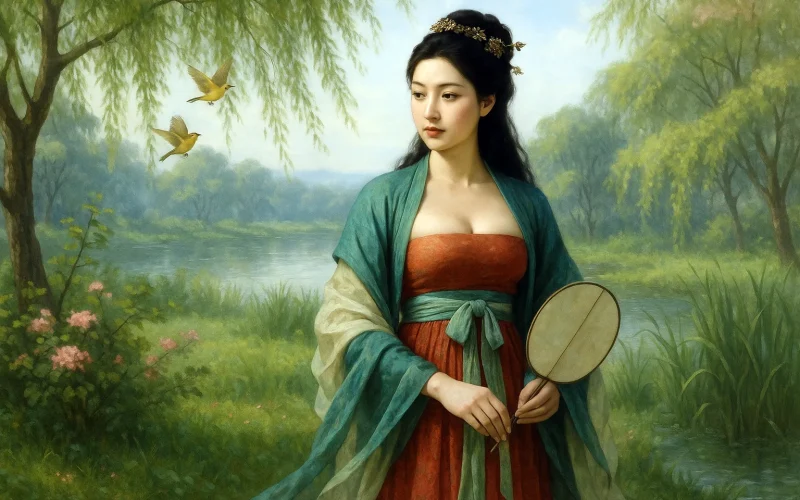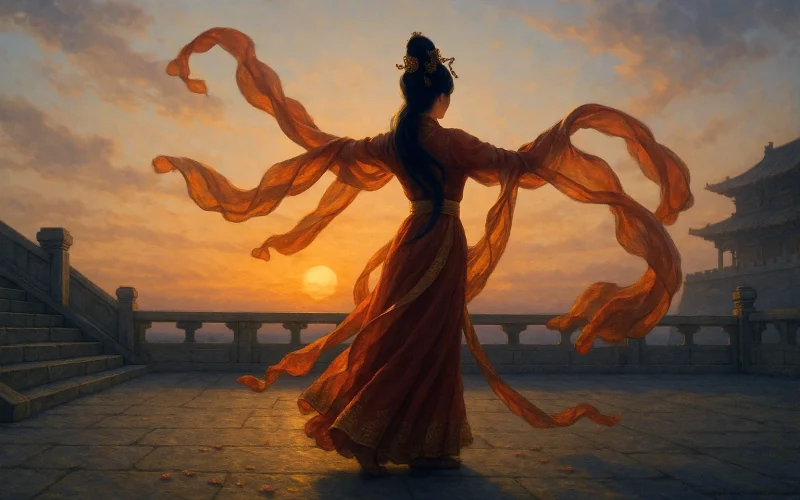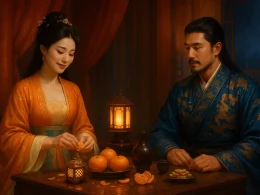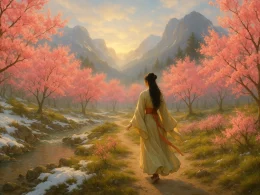In Royal Garden, orioles flit, flit through the scene,
At Kunming Lake, lush rushes grow, unseen.
How precious yet how vain spring's glorious hours!
Why face the mirror, cherishing transient flowers?
Original Poem
「拟娼楼节怨」
刘方平
上苑离离莺度,昆明幂幂蒲生。
时光春华可惜,何须对镜含情。
Interpretation
This work by the Tang Dynasty poet Liu Fangping takes an imagined "Courtesan's Festival" as its theme—not a real holiday, but a scenario personifying the feelings of a singing girl or courtesan, expressing the regret in women's quarters over the passage of time and fading youth. Liu Fangping lived during the Tang Dynasty’s transition from prosperity to decline, an era when many scholars harbored anxieties. He often used persona pieces to convey female perspectives, channeling his own reflections. While the poem superficially depicts spring scenes in the palace gardens and a woman’s emotions, it embodies deeper concerns about the fleetingness of time and the emptiness of life.
First Couplet: "上苑离离莺度,昆明幂幂蒲生。"
Shàngyuàn lílí yīng dù, Kūnmíng mìmì pú shēng.
In the Imperial Garden, orioles flit through the lush trees;
By Kunming Lake, the rushes grow thick and dense.
This couplet paints a scene: "Imperial Garden" and "Kunming Lake" indicate a royal palace setting, luxurious yet evoking solitude. "Flit through the lush trees" (离离莺度 lílí yīng dù) suggests frequent movement and vitality; "rushes grow thick and dense" (幂幂蒲生 mìmì pú shēng) portrays vigorous growth. The spring scenery is vibrant but implies the passage of time and the deepening of years.
Second Couplet: "时光春华可惜,何须对镜含情。"
Shíguāng chūnhuá kěxī, héxū duì jìng hánqíng.
Time and spring’s splendor are lamentably brief;
Why face the mirror with tender attachment?
Transitioning from scene to emotion, this couplet speaks directly from the heart. Through a woman’s voice, the poet laments that beautiful spring and youth are equally transient. Lingering before the mirror in self-pity only wastes precious moments. The act of "facing the mirror with tender attachment" (对镜含情 duì jìng hánqíng) reflects both women’s regret over fading youth and the poet’s own contemplations.
Holistic Appreciation
Though written in persona, this poem carries profound resonance. The opening lines, with "orioles flitting" and "rushes growing," depict vibrant spring scenes that subtly suggest the impermanence of prosperity and the approach of decline. The latter half, with "facing the mirror with tender attachment," delves into the inner mind, forming a natural shift from scene to feeling. "Spring’s splendor" (春华 chūnhuá) serves as both a natural image and a metaphor for youth; through a woman’s voice, it expresses regret over the brevity of youth and the emptiness of passing years. This emotion is not merely personal grievance but mirrors the poet’s broader anxiety about time’s passage and the human condition.
In concise language, the poem is rich in meaning: twenty characters capture both the beauty of spring and the transience of youth, conveying both a woman’s self-sorrow and a scholar’s lament about life.
Artistic Merits
- Persona narrative with deep resonance: Using a woman’s voice to express regret over fading youth and misspent life creates an empathetic effect.
- Natural transition from scene to emotion: Beginning with garden scenes and moving to mirror-gazing, the scenery inspires the feeling, and the feeling arises from the scene.
- Concise and refined language: Simple yet layered, the twenty characters progress in meaning with profound implications.
- Delicate use of symbolism: Spring’s splendor symbolizes youth; the mirror reflects the self—emotion is embedded in objects, blending scene and feeling.
Insights
This poem reminds us that life’s prime, like spring’s beauty, is fleeting. Indulging in self-pity only wastes time; only by seizing the present and cherishing the years can we live up to spring and youth. From the poet’s technique of conveying ideas through objects, we also learn that even a short persona poem can embody profound philosophical reflections on life.
About the Poet
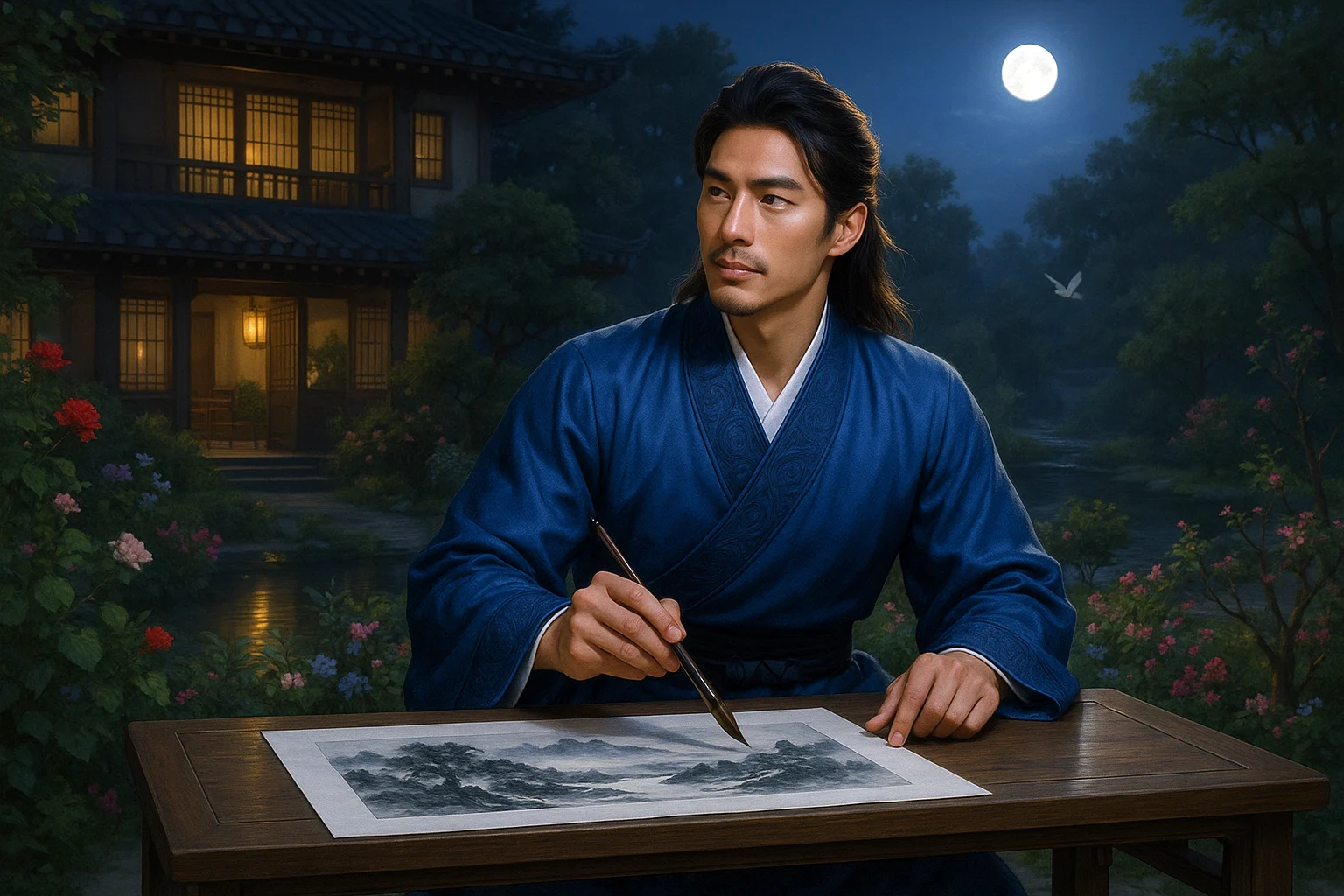
Liu Fangping (刘方平 c. 742 – c. 785), a native of Luoyang in Henan. A recluse-poet and painter spanning the High to Mid-Tang period, he distinguished himself with a delicate and subtle poetic style skilled in depicting boudoir lament and moonlit nights. Though only 26 of his poems survive in the Complete Tang Poems, works like Moonlit Night and Spring Lament secured his place in the canonical hall of Tang poetry. Hailed as "the pure voice of the High Tang and the herald of the Mid-Tang," his poetry fused the lucidity of the Qi-Liang style with Zen serenity, profoundly influencing the later ci lyric tradition and Heian-era Japanese women's literature.






